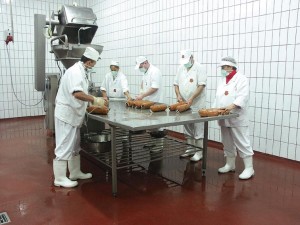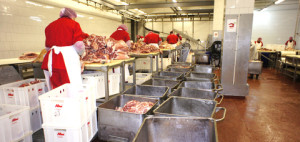It took RTJ Tastes Ltd around 18 months to get their China business up and running, during which time they had to go through the not inconsiderable formalities of certification and the organisation of production and trade, as well as the process of hiring and training staff. Although its mother company is in Poland, RTJ’s production in China serves only the domestic market. According to Executive Director Jacky Kasperowicz, production costs in China are considerably higher than in Poland as a result of many factors, including the difficulties of sourcing high-quality raw materials. Yet despite this, and other challenges that they encounter on a daily basis, Kasperowicz is upbeat about their Chinese operation and explains they are even planning to expand their product range.
When Jacky Kasperowicz considers the rapid pace of change and development taking place in China it is hard for him not to draw comparisons with his native Poland. Fifteen to 20 years ago it was going through a similar transformation, and these days he says he is prone to regular bouts of déjà vu. But his sense of having seen it all before gives him an advantage, he says it helps him to “plot scenarios for consumer behaviour, and the industry in general, over the coming years.”
A major player in the Polish meat industry, Kasperowicz says that RTJ Taste’s decision to enter the Chinese market was a result of an invitation to invest here along with a desire to expand into the Asian market as a whole. They identified a growing potential consumer base, with an increased desire amongst Chinese consumers for Western food products. The move also represented an opportunity to build customer awareness in a market that was previously dominated by very poor quality meat products.
Initially the statistics that Kasperowicz studied appeared very attractive indeed—a population 35 times the size of Poland, food consumption growing annually and double-digit annual growth in food purchasing and food imports. But the statistics were just indicators, not a key to open the door to the Chinese market. Beyond the numbers lay the realities of conducting business in China.
“Every day our company is faced with many issues such as the purchase of raw materials, production and delivery logistics,” says Kasperowicz, “and we have to deal with a very inefficient distribution system here, which is two to three times less effective than in Europe.”
Another challenge they face is production lead times. At five days the cycle of production is around five times longer than in Poland. This is due to the fact that they use less salt and four times less nitride than European standards, so the curing process takes much longer. The benefit, though, is a finished product that is much more natural, bereft of mass, industrial production methods.
The adoption of such standards of production requires large amounts of labour and a reduction in the reliance on machinery, and this necessitates a huge amount of supervision of the manufacturing process and intensive training for the Chinese workers.
One of the concerns frequently raised by their customers is the issue of production quality. Kasperowicz points out that the company is heavily reliant on the experience of their Polish staff who are directly involved in the supervision of production and suppliers. Their production uses 100 per cent fresh meat, which is delivered hundreds of miles from professional farms, and staff carefully examine every batch of meat in terms of grading (percentage of meat, fat and water), correct temperature across a cross section of the meat, pH levels and microbiology (bacteria content).
Periodic inspections of suppliers is also essential. Because meat constitutes 98 per cent of the ingredients of their sausages it is particularly important to monitor conditions of slaughter and processing of the pork, which all comes from within China. In addition to providing safe, clean meat, Kasperowicz says the analysis and selection of the components of the meat they use is also important. “Suppliers must be able to demonstrate consistency of the product they supply, as this influences the parameters that are set for the whole production process. Other semi-finished products are imported from Europe as they are not available on the Chinese market,” he says.
Well-established, high production standards and close attention to the quality of meat ensures RTJ’s products remain very stable in tests conducted to measure shelf time and yet they contain up to 50 per cent fewer preservatives than the strict limits set by China’s food standards. However, Kasperowicz stresses that this is contingent on proper storage conditions, according to the recommendations on the packaging of their products.
Despite the operational challenges RTJ are optimistic and Kasperowicz is buoyed by the positive reaction to their products in China:
“In our original marketing strategy we had planned to introduce a few selected products—mainly sausages—to the Chinese market. The market, however, has forced us to develop this plan. Our product range has already been extended by a further eight new products, and we plan to introduce 15 more over the next quarter. In addition to the traditional, smoked Polish sausages, we already have smoked bacon and ham, and we are currently conducting tests with ripening sausages.”
The company also has plans to develop products characteristic of Italian, French and Spanish cuisine in the future. However, in addition to aiming for authenticity, Kasperowicz says that they are always careful to adapt their products to suit Chinese tastes, for example, the proportion of spices used in their Polish sausage is different to those produced in Poland. Surprisingly they actually use less, as Chinese tastes are plainer than those of Poles.
Although the scale of production in China is nowhere near comparable to their Polish mother company, NIK-POL Ltd (it currently represents less than 1 per cent of the total share), they expect their Hussar brand to be associated with other high quality products within the Chinese market. Says Kasperowicz, “This is still a very niche market in China, but we have a group of very loyal fans. The Chinese market is very interesting to us because of the high culinary requirements; the Chinese people are known for seeking new, quality culinary experiences.”
RTJ Tastes Ltd is a European Sausage Manufacturer with 25 years of experience. RTJ Tastes Ltd related group of companies own European production lines and distribution centres, employing 800 people with a daily production capacity of 80 tonnes. Their production line is supervised by a team of experienced European technologists in order to deliver top-quality products that maintain the highest European standards to their valued customers.




Recent Comments